The poll conducted at the beginning of March by the Palestinian Center for Policy Survey Research (PCPSR) headed by Dr. Khalil Shikaki, and whose findings were published towards the end of March, highlights the consciousness of struggle and resistance in Palestinian society and its rigid and unwavering collective psychological foundations. The Center has published quarterly polls since the mid-1990s, with each poll including several identical questions about the respondents’ political preferences and priorities regarding Palestinian national goals and the fundamental pressing problems that need to be addressed. The poll also includes specific questions that change depending on the different contexts following significant events.
The results of the identical questions allow for systematic tracking and comparison over many years, as well as detection of trends and changes, if there are any. The respondent population is broad and represents Palestinian society in the Gaza Strip and in Judea and Samaria, with the polls conducted by data collectors physically interviewing the respondents in their homes, not an online or telephone poll. Due to the conditions in the Gaza Strip following the war, only Palestinians living in relatively safe places in southern Gaza were polled, and the pollster notes the possibility of certain biases in the results.
The important issues examined in this poll, as well as in the previous poll conducted in December 2023, were the respondents’ position regarding the murderous attack on October 7, the level of support for Hamas and for Yahya Sinwar, the responsibility for the outbreak of the war and for the humanitarian conditions of the population in Gaza, the identity of those who committed war crimes, and expectations and preferences regarding the governing body in the Gaza Strip after the war. The respondents were also asked the identical questions included in all prior polls.
Some of the findings reflect a Palestinian dialectic that needs to be explained beyond the poll findings. Thus, for example, support for Hamas and preference that it remain the sovereign governing entity after the war, alongside harsh criticism of Hamas regarding fair distribution of humanitarian aid, or increased support of a two-state solution. Some will view the increased support of a two-state solution as an awakening realization on the part of the Gazan public, and recognition of the damage brought upon them by the war launched by Hamas. However, past experience shows that support of a two-state solution for the most part expresses a general position that does not address and take into account the essence of such a solution. Other polls conducted by the PCPSR presented the respondents with the elements of a two-state solution, in which case support of this idea and solution declined sharply.
The poll results indicate a growing trend of radicalization, or at least more extreme and militant positions of the Palestinian public in Judea and Samaria compared to those in the Gaza Strip. The explanation, at least in part, appears to stem from the deep disappointment of the Palestinian public in Judea and Samaria with the Palestinian Authority and its President. Hamas, on the other hand, is viewed as successful in producing change, in reviving international attention to the Palestinian issue and in restoring Palestinian national honor by the mere damage it caused Israel. The fact that the residents of Judea and Samaria are far from the battlefield allows for such a position, as it is easier to be nationalistic and unwavering when you don’t have to pay the price of the war or experience it first-hand.
The trends emerging from the poll reflect Palestinian willingness to justify the massacre and atrocities of October 7, as well as their inability to take responsibility for their actions. This, in addition to the stance that prefers inflicting continued damage on Israel instead of a political process or building state, economic and civil society institutions on the path to independence. This approach is part of the Palestinian collective consciousness which chooses “resistance” over negotiation, and views the right of return as the ultimate goal. Accordingly, entities representing these values such as Hamas enjoy broad Palestinian support, while the Palestinian Authority is seen as having abandoned the path of resistance in favor of a political process that does not advance Palestinian national goals, and despite the failure continues to maintain security cooperation with Israel. In effect, the Palestinian Authority is perceived as serving the goals of the “occupation” while it itself is corrupt, excludes local leaders and fails to function as a governing entity.
Support of the October 7 Atrocities
The poll results reflect the problematic psychological foundations of Palestinian society, as revealed with respect to the atrocities carried out on October 7, almost a half year after they took place. The Palestinians, it appears, do not take responsibility for their actions, and prefer to focus on damaging Israel instead of on building a civil society, institutions and its economy on the path towards its independence. As they see it, they will achieve their goals by waging an armed struggle against Israel, and therefore give their support to those who espouse and act on this plan and position.
Thus, for example, 71% of the Palestinians think that the decision to launch the surprise attack on October 7 was correct and justified – 1% less than the results of a similar poll conducted in December 2023. In the Gaza Strip, support of the massacre increased from 57% to 71%, whereas in Judea and Samaria support of the attack decreased from 82% to 71% compared to December. At the same time, only 19% responded that the attack was incorrect compared to a higher portion of respondents, 22%, in the prior poll. The cumulative significance of the last two findings indicates broader support of the Hamas attack, despite the terrible price the Palestinians have paid.
/*! elementor - v3.21.0 - 30-04-2024 */
.elementor-widget-image{text-align:center}.elementor-widget-image a{display:inline-block}.elementor-widget-image a img[src$=".svg"]{width:48px}.elementor-widget-image img{vertical-align:middle;display:inline-block}
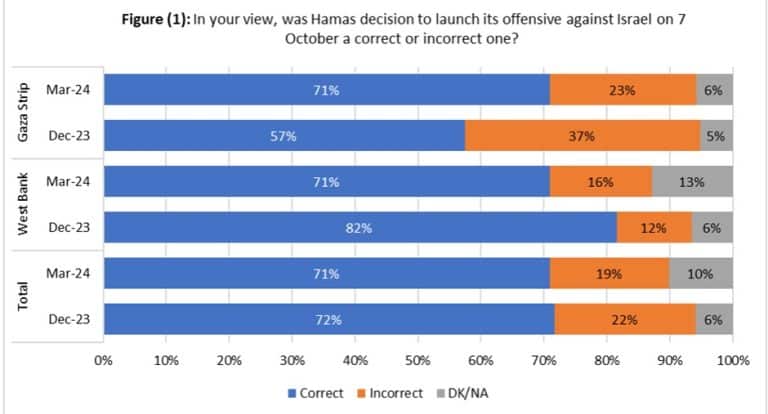
March poll: PCPSR, p. 5
Worse still, a majority in fact blames Israel for the current suffering of Palestinians: 64% think that Israel is responsible, compared to 52% in December. Only 7% place the blame for the Palestinian suffering on Hamas, and 6% on the Palestinian Authority. The percentage of Gazans who blame Hamas dropped from 19% in December to only 9% in March, indicating that they have not internalized what the Hamas wrought upon them, mainly showing the breadth and depth of the support for Hamas and for the October 7 attack.
The poll results also show the Palestinian’s inability to take responsibility for their actions, despite the extensive documentation. According to the poll, 90% of the Palestinians think that Israel is the one committing war crimes, and only 5% think Hamas committed war crimes during the current war. The operating mode of the Hamas terror organization – in other words, armed resistance, including acts of massacre and using the civilian population as a human shield – is considered legitimate.
In the long-term as well, the poll results show that the Palestinians are not interested in a solution of peace with Israel. Thus, for example, despite a slight increase in support of the idea of a two-state solution, especially among the respondents in Gaza – supposedly a relatively positive finding, reflecting a realization that Israel will not disappear off the map, as well as a certain duality towards the Hamas – armed struggle still remains the preferred method among all Palestinians (46% among the total population, 51% in Judea and Samaria and 39% in the Gaza Strip) as a means of establishing a Palestinian state and ending the “occupation”. Much smaller support, 18% of respondents, selected non-violent resistance, and only a quarter of the Palestinians that answered the poll selected negotiations with Israel as a means of achieving Palestinian goals. Even worse, exactly one third of the Palestinians believe that the first most vital goal should be to obtain the right of return for 1948 refugees – a finding reflecting the significance of this element in the national ethos and in the Palestinian collective psychological foundations. The significance of realizing the right of return in practice means denying Israel’s right to exist and its elimination as the nation state of the Jewish people.
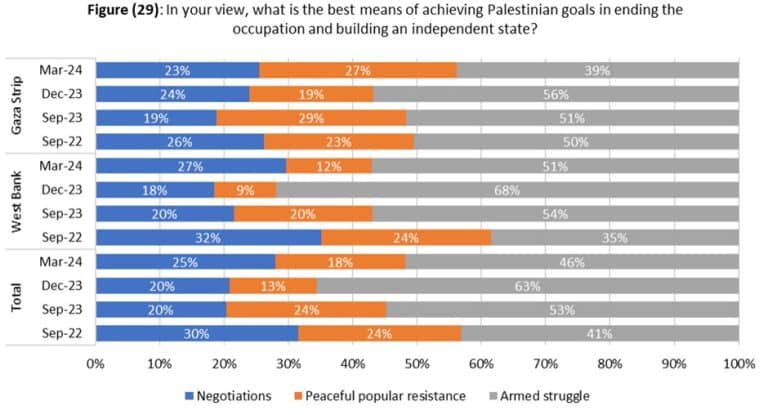
March poll: PCPSR, p. 24
Trends in support of armed struggle are also found in Palestinian support of external actors during the current war: among the Arab/regional actors, the highest level of public satisfaction was found with the performance of the Houthis. 83% support the Iranian arm in Yemen that led to the blocking of the Bab el-Mandeb Strait and attacks on Israel. This is followed by satisfaction with the performance of Qatar (56%), but also with Hezbollah (48%) and Iran (30%). Jordan and Egypt (22% and 12% respectively) lag far behind. A mirror image of these poll results is satisfaction with the non-regional international actors: the highest level of satisfaction is with Russia (19%), while the US, which seeks to advance negotiation and establish a democratic Palestinian state, received only 1%.
One of the only rays of light in the poll, in addition to the slight increase in support of the two-state solution, is the drop in support of an armed struggle. Since December there has been a decline in support of terror by all Palestinians from 46% to 35%, and even in Gaza support fell from 56% to 39%. There was a similar drop in Judea and Samaria, from 68% to 51%. Nonetheless, it still remains the most preferred means among all Palestinians compared to the other means presented in the poll. If this trend continues to grow, it may indicate the initial effect of the war in Gaza on the Palestinian position on this issue. Conversely, strong support of armed struggle among the Palestinians in Judea and Samaria signals radicalization trends impacted by the war in Gaza, but no less owing to the Israeli war on terror in the Judea and Samaria territories, which is exacting a high price from the Palestinians, in addition to deep disappointment with the Palestinian Authority.
Continued Support of the Hamas
The poll highlights a concerning phenomenon regarding the collective consciousness of the Palestinian public: despite the fact that Hamas has taken a beating in the war, and despite the suffering and destruction the October 7 attack caused Gaza, the terror organization continues to enjoy widespread popularity among the population in Judea and Samaria, and even in Gaza itself. Moreover, and following justification of the massacre and its goals, the Palestinians in general are satisfied with the functioning of the Hamas and with the way it is conducting the war against Israel. They are unable to see the destruction around them as too high of a price, and prefer to uphold terror despite its ramifications. As noted, this is part of the same consciousness that has not changed, despite the war and its costs.
Thus, for example, 70% of the poll respondents are satisfied with the role of Hamas in the current war – satisfaction that remains stable and is identical to the result in December, reflecting a continuing trend. Regarding specific Palestinian actors, Yahya Sinwar, the leader of the Hamas in Gaza, enjoys strong support for his role: 61% are satisfied with his performance. This shows that Sinwar understands the strong public support for him and for the terror organization he leads, as well as for the trajectory he chose to take on October 7, despite its price. Accordingly, he can toughen his position in the negotiations, and place his survival and that of the organization as the sovereign in the Gaza Strip as the first and foremost goal in the hostage negotiations.
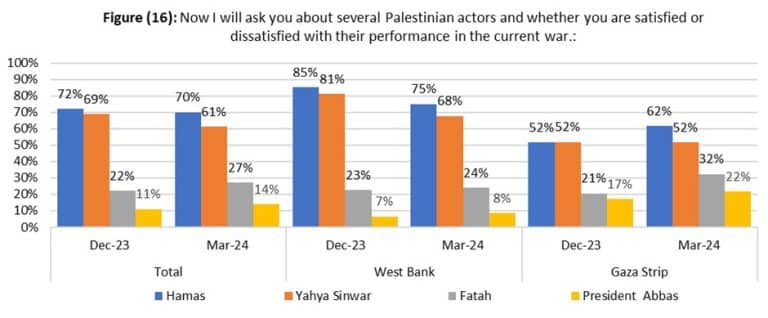
March poll: PCPSR, p. 16
Taking a forward-looking view, a large majority (78%) of the respondents indicated that the war in Gaza will revive international attention to the Israeli-Palestinian conflict, and could lead to increased recognition of Palestinian statehood. This result explains why the war is ‘worthwhile’: it reflects the belief that justifies the violent course chosen by Hamas as a means of achieving the political goal of Palestinian independence, and should therefore be supported. At the same time, the results show that the residents of Gaza prefer the Hamas as the governing entity at the end of the war – when asked about their preference, more than 50% of the Gazans support continued Hamas control over Gaza, an increase compared to the poll in December.
Another poll result reflects the Gazan population’s involvement in Hamas activity: according to Hamas data, a total of about 32 thousand Palestinians have been killed so far in the war in Gaza, and according to various estimates about 13 thousand of them are terrorists. At the same time, 80% of the respondents in the Gaza Strip reported that at least one family member (the degree of kinship is unclear from the wording of the question) was killed or injured during the current war. Despite the lack of clarity regarding the figure, and inability to obtain more accurate data, clearly a very large number of families have relatives who were killed or injured and were among Hamas operatives who were killed. This means that very many families are actively and significantly connected to Hamas.
The results indicate how deeply Hamas is embedded in the civilian population in Gaza. The widespread support for Hamas, and the clear and prominent preference to see it as the governing body in the Gaza Strip after the war, points to a society that is mobilized to the struggle and to resistance. This society is not averse to Hamas or feels that it is repressed by the organization. To the contrary, it views Hamas as a torch bearer that is loyal to its cause, and the population is therefore willing to collaborate with the terrorist organization. This is important to bear in mind and to emphasize as part of Israel’s advocacy and awareness-raising efforts against assertions regarding civil society or uninvolved civilians killed or injured in the war. There are of course those who oppose Hamas and do not collaborate with it, but in general this is a mobilized collective that willingly collaborates with Hamas. This enabled the terrorist organization to deepen its hold on civilian life and to operate from civil infrastructures and facilities, as well as from civilian homes.
Nevertheless, and in line with the duality developing in Gaza towards Hamas, certain criticism is evident in Gaza regarding some aspects of the terror organization’s activity in Gaza. Thus, for example, when asked whether the process of aid distribution by Hamas or UNRWA – an organization whose activity in Gaza is to a large degree controlled by Hamas – is fair or discriminatory on political grounds, many residents expressed dissatisfaction. 56% indicated that Hamas distribution was “discriminatory” compared to 41% who said that the terror organization’s aid distribution is “fair”. UNRWA received even a lower percentage: 70% indicated that the agency’s aid distribution is discriminatory.
As for the humanitarian conditions in the Gaza Strip, the poll results contradict the commonly held accounts about heavy famine in Gaza. While almost half the respondents in Gaza said that they have food sufficient for a day or two, almost 80% noted that if they need food or water there is a place they can reach that can provide the assistance, but “at a risk” or with “great difficulty”. Only 4% said that there is no place they can reach where they can have access to food. A particularly high percentage noted that they have access to medical care and electricity to charge a phone.
Extremism and Weakness of the Palestinian Authority
A clear trend that emerged from the poll results is the irrelevance of the Palestinian Authority in the eyes of most of the population, including in Judea and Samaria. The Authority’s weakness stands out both compared to Hamas and overall. Abu-Mazen’s government is viewed as illegitimate and as a burden on the Palestinian people. A vast majority of Palestinians want Abu-Mazen, the President of the Palestinian Authority, to resign. Another worrying trend is the troubling share of support for Hamas particularly among respondents in Judea and Samaria – a percentage even higher than that among the population in Gaza.
An absolute majority of Palestinians does not believe there will be any change in the Palestinian Authority’s policy or in the living conditions in Judea and Samaria as a result of the appointment of Mohammad Mustafa as Prime Minister, and even opposes change of leadership in Ramallah. An even greater majority thinks that the Palestinian Authority is a huge burden. Thus, Palestinian support goes to Hamas: in Judea and Samaria support for the terrorist organization is 35%, compared to 44% in December. At the same time, support for the Fatah is only 12%. In Gaza the secular Fatah organization in fact receives greater support than in Judea and Samaria, 25%, compared to 34% support for Hamas. Overall, Hamas is considered a more popular alternative.
The poll results also show that Abu-Mazen, the leader of the Palestinian Authority, is not at all popular. His support among the Palestinians is especially low: 16% are satisfied with his performance in the war compared to 81% who are dissatisfied. In Judea and Samaria satisfaction with Abu-Mazen stands at only 8% – a drop from 10% in the December poll. Moreover, 84% of the respondents, including 93% in Judea and Samaria, want the elderly Palestinian leader to resign. In the eyes of the Palestinians, Abu-Mazen is not considered an option in order to continue the struggle for the establishment of a Palestinian state. This can be seen from the percentage of support among the respondents as to the preferred scenario in the day after the war, with the return of the Palestinian Authority under Abu-Mazen receiving only 18%, compared to 63% who prefer continued control of the Hamas in Gaza.
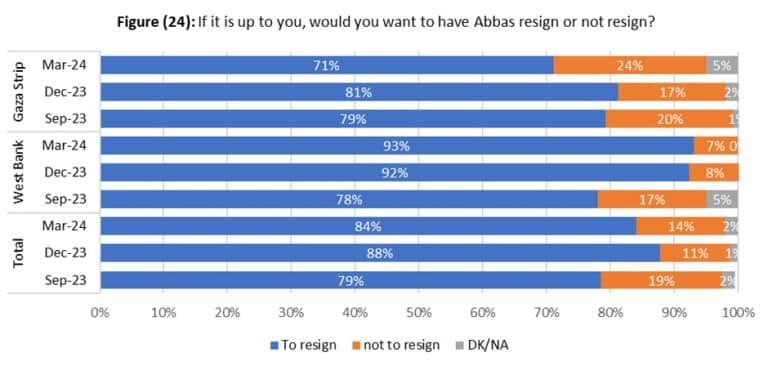
March poll: PCPSR, p. 20
Moreover, this trend is also reflected in the poll question regarding hypothetical presidential elections if they were to take place today. The only candidate that could beat Ismail Haniyeh in these elections would be Marwan Barghouti, who is in jail in Israel. Abu-Mazen, Mohammad Mustafa, as well as former Palestinian Authority Prime Minister Mohammad Shtayyeh, would lose to the leader of the Hamas if they ran against him.
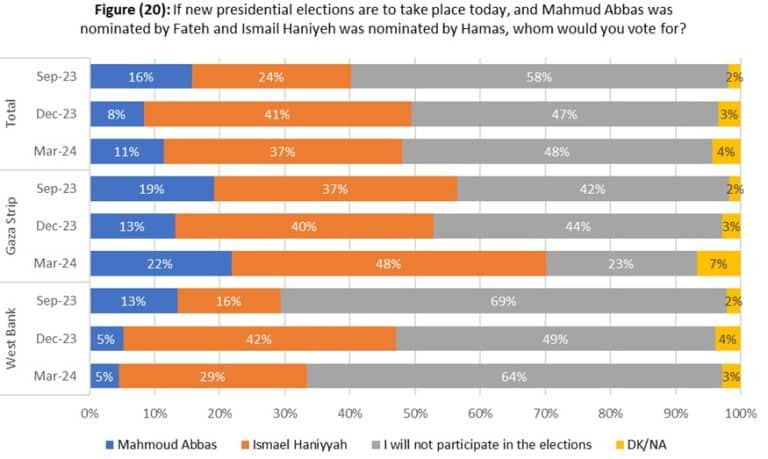
March poll: PCPSR, p. 18
Accordingly, while 62% of the respondents in Gaza indicated they were satisfied with the role of Hamas in the war, a higher percentage, 75%, of the respondents in Judea and Samaria are satisfied. This is also the case regarding satisfaction with the role played by Yahya Sinwar: 52% in the Gaza Strip, but 68% of the respondents in Judea and Samaria. At the same time, a higher percentage of respondents who would prefer to see continued control of Hamas in the Gaza Strip is found in Judea and Samaria – 64%,overall.
As noted above, the positions reflected in the poll results are related to the perception of the Palestinian Authority as an irrelevant and corrupt entity, while the residents of Judea and Samaria suffer less than the Gazans from Israeli operations and therefore do not direct their anger at Hamas or think that its decision to launch the October 7 attack was wrong. However, the results indicate a more serious trend: not a steady trend but a trend that is growing stronger, with increased radicalization in Judea and Samaria in espousing an ideology of an armed struggle and support for Hamas. According to the poll, the differentiation Israel tried to make between the residents of Judea and Samaria and those in Gaza in order to manage the conflict is not working. This is the case since in the eyes of the residents of Judea and Samaria the two-state solution is not the preferred solution. Instead, they prefer the Hamas and an armed struggle against Israel. Therefore, if the Hamas terrorist organization were to take control of the Palestinian Authority now, it is not at all certain that it would receive a cold shoulder from the local residents, as they also support the organization and believe in its doctrine and ideology.
Summary
The PCPSR March poll results provide findings about the position of the Palestinian public, both in Judea and Samaria and in the Gaza Strip, on a wide range of current issues. Beyond this, they also tell a story and paint a clear picture of the Palestinian collective consciousness regarding the conflict with Israel and its solution. The results point to a rigid Palestinian ideology, an idée fixe that prefers extreme action over moderation and pragmatism, while persistently and defiantly rejecting self-examination.
The poll shows that despite specific criticism of Hamas on particular issues, such as the distribution of humanitarian aid in Gaza, overall the respondents are satisfied with its functioning as an organization and with its leaders. Furthermore, the Palestinians do not turn their back on Hamas and in fact support it in large numbers, despite the suffering caused them by the war. The respondents’ answers demonstrate the scale and scope of the involvement of the Gazan population in Hamas activity, and how deeply and ubiquitously Hamas is embedded in the civilian population in Gaza and enjoys its support – the same population that is considered “innocent” or “uninvolved”. Concomitantly, the Palestinians give their support to external entities operating in a similar manner and promoting terror and attacks against Israel, whether these are the Houthis or Hezbollah, while they loath the Palestinian Authority which they see as corrupt and detached. If Palestinian elections were held today, the only probable winners would be the leaders of the Hamas or the convicted Marwan Barghouti.
This collective Palestinian approach, as inferred from the poll results, stems from their inability to take responsibility for acts of terror, such as the atrocities of October 7, while placing the blame on others – such as the “occupation” or Israel, which is the only one blamed for committing war crimes. The Palestinians, so it seems, also think that the changing reality perpetuated by Hamas is preferable to the stagnation and unchanging conservatism represented by the Palestinian Authority in Ramallah. The poll respondents believe that this change is the optimal way to awaken and drive the world to help them and to grant them what they want. Therefore, among the Palestinians there is a clear preference for terror and destruction, which as they see it brings about rapid and significant change in reality, as opposed to slow, often difficult and prolonged constructive building of state institutions, conducting a political dialog and diplomacy.
Therefore, despite a certain decline in support of armed struggle according to the poll results, and even a slight increase in support of the two-state solution – two seemingly encouraging results, that may even signal the beginning of a genuine trend stemming from internalization of the lessons of the war – the majority of the Palestinians still show a preference for an armed struggle against Israel in order to gain their independence. A third of the Palestinians even extol the right of return as the ultimate goal, which means the elimination of the State of Israel as the nation state of the Jewish people, and not recognizing its right to exist as such. At the same time, the poll shows sharp radicalization among the Palestinians in Judea and Samaria, those who do not live under control of Hamas and whose attitude towards the issue is more extreme than that of the residents in Gaza. Regardless of the reasons, the widespread support of terror in Judea and Samaria, and worsening radicalization on a host of current issues, must raise a red flag and be seen as a warning sign by Israel and the Western countries.
In summary, the poll results point to a worrying phenomenon among the Palestinian public: an armed struggle consciousness, support for the Hamas, weakness of the Palestinian Authority and support of the October 7 atrocities – as part of the collective psychological foundations of this population. Palestinian society upholds the idea of the elimination of the State of Israel by means of violence and terror, and of realizing the right of return as a goal that is more important than the establishment of an independent and functioning Palestinian state achieved by peaceful means. Therefore, any progress towards the vision of two nation states, peacefully living side by side, requires deep and profound change in the collective psychological foundations of Palestinian society and its leaders. The poll results show that we still have a long way to go and are still very far from the hoped-for change.




